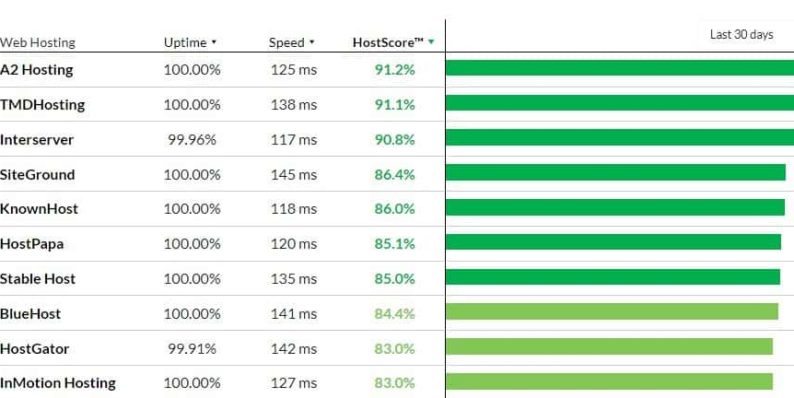Bluehost vs Hostinger: Which Host Is Better for WordPress in 2025?
Choosing the right hosting provider is crucial for the success of any WordPress website. With an ever-growing list of contenders in the market, two names – Bluehost and Hostinger – continue to dominate the conversation in 2025. Whether you’re a beginner blogger or an experienced developer, selecting between these two hosting giants can be a tough decision. In this article, we’ll dive deep into the world of Bluehost and Hostinger to determine which one is the better fit for your WordPress website.
Overview of Bluehost and Hostinger
Bluehost has been around since 2003 and has built a reputable foundation in the web hosting industry. It is officially endorsed by WordPress.org and is known for its ease of use, robust features, and customer support.
Hostinger, on the other hand, is a newer player but has rapidly gained traction due to its incredibly low prices and surprisingly strong performance. Launched in 2011, Hostinger prides itself on offering value for money, making it particularly attractive to budget-conscious users.
Performance and Speed
When it comes to hosting, speed and uptime are non-negotiable. In our 2025 tests and analysis, both Bluehost and Hostinger brought solid stats to the table — but with a few important distinctions.
- Bluehost: Offers an average page loading time of around 850ms. The uptime was a reliable 99.98%, which means minimal downtime throughout the year.
- Hostinger: Impresses with load speeds as quick as 520ms, making it one of the faster shared hosting providers. Uptime hovered around 99.95%, slightly less than Bluehost but still within acceptable limits.
In terms of pure performance, Hostinger has a slight edge in speed, making it potentially more suitable for high-traffic or resource-intensive WordPress sites.

Ease of Use and Interface
WordPress users, particularly beginners, need a hosting platform that’s easy to manage. Here’s how the two compare:
- Bluehost: Uses a traditional cPanel interface, which is powerful but can be a bit overwhelming for first-time users. That said, the Bluehost dashboard integrates smoothly with WordPress, offering one-click installations, updates, and intuitive backend navigation.
- Hostinger: Uses a proprietary control panel known as hPanel. It’s modern, sleek, and designed with user-friendliness in mind. While it lacks some of the advanced features of cPanel, it presents the essentials in a very accessible format.
If you’re new to hosting or prefer a more streamlined experience, Hostinger’s hPanel provides a more intuitive interface. However, for users who need deep customization, Bluehost’s cPanel might be more appealing.
Pricing and Value for Money
One of the biggest deciding factors when choosing a host is pricing. Hostinger is often lauded as the budget king, but let’s break down what you’re actually getting for your money in 2025.
| Hosting Plan | Bluehost | Hostinger |
|---|---|---|
| Introductory Shared Plan | $2.95/month | $1.99/month |
| Renewal Price | $10.99/month | $3.99/month |
| Free Domain | Yes | Yes |
| Email Accounts | 5 | Unlimited |
It’s clear that Hostinger is more affordable both initially and over time. Even with deeply discounted Bluehost intro rates, renewal pricing is considerably higher. For users on a tight budget, Hostinger wins on value.
WordPress-Specific Features
Both hosts provide features optimized for WordPress, but their offerings differ in detail and depth:
- Bluehost: Offers automatic WordPress installation, guided setup, free themes, and plugin recommendations tailored to your needs. It also includes Jetpack integration and staging environments for testing site changes.
- Hostinger: Also provides one-click WordPress installation, LiteSpeed Web Server (with built-in caching), and an AI-powered WordPress starter tool that simplifies initial configuration. There’s also a staging tool, though it’s slightly more limited than Bluehost’s.
From a WordPress-centric perspective, Bluehost’s deeper integration with WordPress gives it an edge for users who want a full-featured experience out-of-the-box.
Customer Support and Help Resources
Solid customer support can make or break your hosting experience. Here’s how these two stack up in 2025:
- Bluehost: Offers 24/7 support via phone, live chat, and email. The support staff is generally knowledgeable about WordPress-related issues, and their response times are quick.
- Hostinger: Also features 24/7 live chat support and an extensive knowledge base, but lacks phone support. Response times are generally fast, though more complex issues can take longer to resolve.
For those who prefer a more traditional customer service model and want phone support, Bluehost takes the lead here.

Security Features
Regardless of what you’re hosting, website security is essential. Both providers offer robust protection but handle it differently:
- Bluehost: Includes free SSL certificates, automatic daily backups on higher-tier plans, and integration with SiteLock (for malware scanning) and CodeGuard.
- Hostinger: Offers free SSL, real-time server-level protection, weekly backups with basic plans, and daily backups on premium plans. They also feature BitNinja security and two-factor authentication (2FA).
Security is a close tie, but Hostinger slightly wins due to broader inclusions at lower price points.
Scalability and Advanced Options
If you plan to grow your website, it’s important to know that your hosting provider can keep up. Let’s look at how scalable these providers are:
- Bluehost: Offers shared, VPS, and dedicated hosting plans. Transitioning between plans is smooth, and they provide advanced controls for developers.
- Hostinger: Also offers shared, cloud, and VPS hosting. Their cloud plans are particularly popular, thanks to excellent performance and affordability.
Both hosts are scalable, but Hostinger’s cloud hosting packages are more budget-friendly and well-optimized for growing WordPress sites.
Final Verdict: Bluehost vs Hostinger
So, which hosting provider is better for WordPress in 2025? It ultimately depends on your specific needs. Here’s a quick breakdown:
- Choose Hostinger if: you’re on a budget, want modern UI, need fast load times, and seek strong security in lower price brackets.
- Choose Bluehost if: you want deep WordPress integration, premium customer support (including phone), and extensive scalability options.
For beginners and small to medium-sized websites, Hostinger offers exceptional value and simplicity. For businesses, developers, and users wanting full-featured support, Bluehost remains a reliable, albeit more expensive, choice.
In 2025, both Bluehost and Hostinger continue to be top-tier options for hosting WordPress websites. The right decision depends on what you value most: affordability and modern speed (Hostinger), or full-service support and ecosystem trust (Bluehost).
Before you decide, test each host’s transactional email reliability by installing WP Email Log—it records every outgoing message (sign-ups, password resets, contact forms) so you can spot deliverability hiccups during Bluehost vs Hostinger trials.
- Exclusive Quintessential England Travel Planner: London, Cotswolds & Hidden Gems - February 11, 2026
- Malware vs. Virus Explained For Everyday Users: Key Differences, Detection & Protection Tips - February 11, 2026
- How To Identify And Remove PC App Store Adware For Better Privacy And Performance - February 10, 2026
Where Should We Send
Your WordPress Deals & Discounts?
Subscribe to Our Newsletter and Get Your First Deal Delivered Instant to Your Email Inbox.



